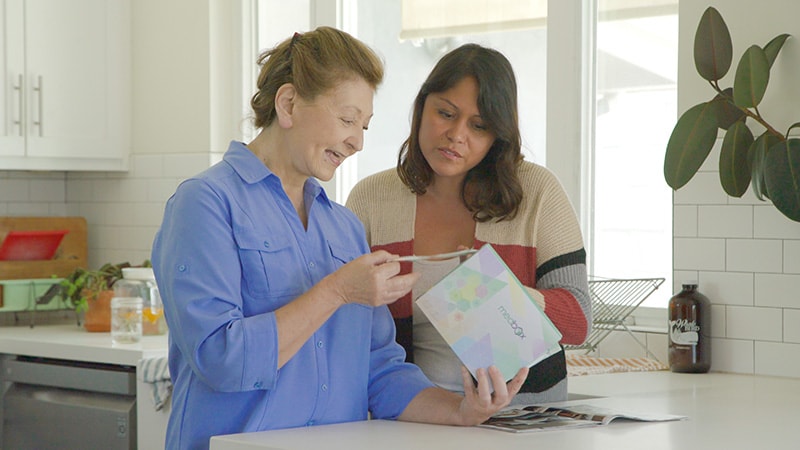A Guest Blog from Ameripharma
Finding out a loved one has been diagnosed with Alzheimer’s disease can cause stress and uncertainty. Discover the Alzheimer’s dos and don’ts that every caregiver should know and learn how to navigate even the most difficult situations. Alzheimer’s disease is the most common form of dementia and affects approximately 5.8 million Americans, according to Alzheimer’s Association. Those with the disease experience a gradual deterioration of memory and cognitive thinking, which can interfere with a person’s ability to communicate and complete daily tasks. As the disease progresses, a person with Alzheimer’s will require additional care and assistance with daily tasks. When taking on the role of a caregiver, it’s important to understand the dos and don’ts of caring for someone with the disease. Here are some quick tips to help you prepare for the changes to come.
How to handle communication:
Do: Be kind and patient. A person with Alzheimer’s disease will need more time to process what you tell them. Use short phrased sentences, repeat your instructions in the same way, and give them ample time for comprehension. It’s also important to note that those with Alzheimer’s lose the capacity to reason through logic more and more as time goes on. Although a concern they are feeling is from a fabricated situation, the feelings of fear, anger, or confusion are real and should be addressed with empathy and understanding. Instead of trying to explain why they are wrong, acknowledge their feelings and reassure them that you are there to help them resolve the issue. Distraction has also been found to be useful in diffusing tense situations. Instead of engaging in an argument, change the subject to a more pleasant one. You can also leave the room and come back before beginning the conversation again.
Don’t: For a person with Alzheimer’s, asking them to remember or questioning a recent
memory is a constant reminder of their disability. They may become highly defensive, which can lead to arguments. Avoid trying to argue or reason with them as it will further aggravate the situation leading to more stress for you and your loved one. It’s important to remember that those living with Alzheimer’s are worried about losing their independence and scared that their disease is progressing. The more you make them feel that they are unable to make decisions or remember facts, the more hostile they will become towards you.
What to do when guests come to visit:
Do: Prep your visitors on how to communicate with someone with Alzheimer’s with the tips above. It may also be helpful to share some odd recurring behaviors. Let visitors know which conversation topics they enjoy and which to avoid, so they know what to expect. DailyCaring.com also advises keeping visitors to about one or two at a time and to schedule visits during a part of the day when they are in a more positive mood. If your loved one is feeling particularly aggravated that day, you might want to reschedule the visit. Guests should also introduce themselves when they arrive, even if they are already familiar.
Don’t: When visitors arrive, don’t ask your loved one if they remember the person. Encourage your guests to avoid saying, “Do you remember…” at all. Reminiscing about pleasant memories can be great for a person with Alzheimer’s as it brings them back to happier times. However, it’s important to mind your phrasing. Instead of saying, “Do you remember when you used to read me this book,” try saying, “I loved when you used to read me this book as a child.” Also, please don’t talk about them as though they aren’t in the room. This condescending behavior can cause embarrassment and anger from your loved one.
How to prepare yourself as a caregiver:
 Do: Learn about the disease and how it can affect your loved one. Understand the symptoms and the solutions to help keep them healthy and safe. As the disease progresses, even the most simple tasks can be challenging for a person with Alzheimer’s. Volunteer to help with daily tasks like managing finances or taking them to doctor appointments. Present it in a way that comes from a place of help and support without bringing up the deficiencies caused by their disease.
Do: Learn about the disease and how it can affect your loved one. Understand the symptoms and the solutions to help keep them healthy and safe. As the disease progresses, even the most simple tasks can be challenging for a person with Alzheimer’s. Volunteer to help with daily tasks like managing finances or taking them to doctor appointments. Present it in a way that comes from a place of help and support without bringing up the deficiencies caused by their disease.
As a caregiver, it’s also essential to take care of yourself. It can be physically, emotionally, and financially draining to care for someone with Alzheimer’s. Even the most well-intentioned person can grow tired and frustrated. Take advantage of respite care or ask family members to step in for you for a while so you can take time to relax or do personal activities. Look for services that can help with some of your errands. A grocery or meal delivery service can help make mealtime and shopping less stressful. You can also try a prescription pill sorting service, like MedBox, instead of going to the pharmacy and sorting daily medications yourself.
Don’t: There will be plenty of times when the person you are caring for becomes defensive or says harsh words. Don’t take it personally. You can’t control what they say or how they act, but you can manage your reactions. There will be good days and bad days, and it’s important to remember that you are doing the best you can. Don’t be too hard on yourself and don’t try to take everything on by yourself. For you to be the best caregiver, you need to also ensure that your basic needs are met. Failing to care for yourself properly can cause feelings of anger, resentment, and bitterness, especially toward the person you are caring for. Don’t be afraid to ask for help from others. This can be in the form of emotional support from a friend, or in asking a family member to help take care of errands. Ask for help when you need it and find someone to talk to for support.
The road ahead will undoubtedly present highly challenging situations. You are not alone, and there are plenty of resources to help you as a caregiver. What’s important to remember is to always deal with every situation with patience, empathy, and respect. In doing so, you can help maintain a positive and loving relationship with your loved one during this challenging experience.
This is a guest post written by MedBox by AmeriPharma. MedBox is a free pill-dispensing service provided by AmeriPharma pharmacy. No more pill sorting or vitals. Get your prescription sorted by the dose. Learn more at http://getmedbox.com
Connect with MedBox on Facebook, Twitter, Instagram, Youtube, and Pinterest.



